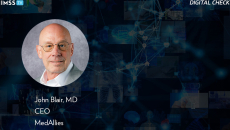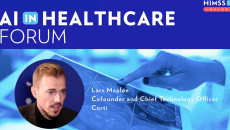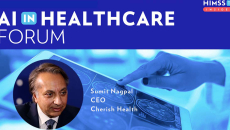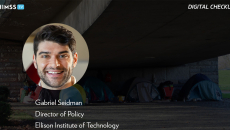Provider
HIMSS24
Hal Wolf, president and CEO of HIMSS, discusses what to expect at the 2024 HIMSS Global Health Conference & Exhibition and the global impact on the healthcare community.
Dr. John Blair, CEO of MedAllies, discusses the benefits and use cases of a qualified health information network, places where interoperability falls short in the healthcare sector and the opportunity for QHINs to increase connectivity.
Lars Maaløe, chief technology officer and cofounder of Corti, discusses the company's provider-facing AI technology, which can help with clinical documentation by providing real-time feedback while listening to healthcare communications.
HIMSS24
Prashant Natarajan, VP of strategy and products at H20.ai, says he is looking forward to discussing generative AI and the patient experience as well as strategies and success stories with fellow HIMSS24 attendees.
Sumit Nagpal, Cherish Health CEO, discusses his new endeavor aimed at health assurance through prevention by using in-home radar technology to track individuals, and the importance of cross-sector collaboration for better patient outcomes.
HIMSS24
Cleveland Clinic ACO's Dr. Jessica Hohman and Cleveland Clinic Florida's Dr. Richard Rothman discuss their upcoming HIMSS24 session on how the hospital system created and evolved its scalable home-based acute and post-acute care models.
Health and homelessness cannot be fixed until the continuum of care around a person is solved, said Gabriel Seidman, director of policy at Ellison Institute of Technology. Tracking and responding using data is vital at government levels.
HIMSS24
Chief information officers Cris Ross and Ed Marx discuss their book to be released in the fall, the role of technology in the patient experience, their personal health experiences and the white paper slated to be released at HIMSS24.
Dr. Peter Bonis, chief medical officer at Wolters Kluwer Health, describes the company's AI-enabled software to detect illicit diversion of controlled and non-controlled substances in patient care and the use of AI in its wider portfolio.
HIMSS24
Brenna Loufek, SaMD regulatory affairs manager at Mayo Clinic, discusses her HIMSS24 session on bringing AI-enabled digital health tools built under research into the clinical setting and what she hopes the audience will gain from the discussion.









